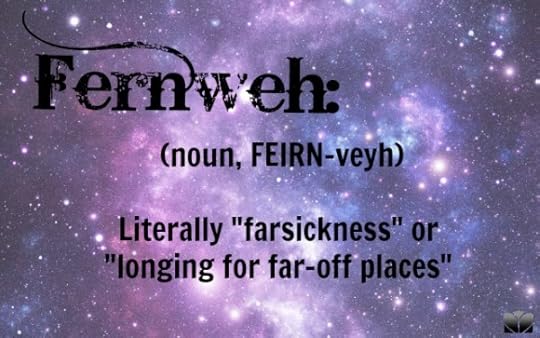Matador Network's Blog, page 2302
March 11, 2014
1 word every traveler should know
I LISTENED to Isa Lei again. The Fijian farewell song is still stuck in my head, and my heart, since my first time visiting in 2007.
When three Fijians sing together, it sounds like a whole choir. With only a guitar and a ukulele, they produce sounds that immediately bring me back to Galoa, the tiny island where I spent a few weeks with a wonderful family. It’s my second home, a place I’ll always remember, and long for. This longing, yearning, craving — in German, you can easily call it Fernweh. In English, there’s no appropriate word.
I could call it “wanderlust,” or “itchy feet,” which are the official translations, but that’s not what it really feels like. Wanderlust means something like the desire or tendency to go somewhere. It’s connected to a joyful feeling or delight, it’s energetic, passionate. Itchy feet gives the impression of a slightly irritated, fidgety feeling. The “travel bug,” or “gypsy bug,” are also related ideas, describing an intense feeling or need to see and explore. But none of this can really describe the concept of Fernweh.
Yes, Fernweh can be passionate and joyful. It can be annoying, like itchy feet. It can be a general need or desire, like the travel bug. Fernweh can be a delight, the excitement at wondering what might happen in your future, the joyous anticipation of what there is to come. But in its most intense manifestation, it’s a strong, gloomy, silent feeling. Often it’s a certain kind of sadness, or melancholy, a craving that won’t stop, and it often is accompanied by heartbreak — the heartbreak you get when you long for a place you’re not sure you’ll ever see again.
Have you ever been homesick? That awful feeling to be somewhere you’re not, the longing for home and your loved ones, the nausea that goes along with it? Take all the emotions from homesickness (Heimweh) and flip them. That’s what Germans call Fernweh: the straining, craving, painful desire to go to distant places, to travel, to see the world.
Literally, it could be translated as “farsickness,” but that still wouldn’t be right. Sickness is still something vaguely different from the German -weh. Sickness usually refers to a feeling in your body, while -weh is more a pain in your soul.
Right now my soul is in pain, because I feel I really should be somewhere else. I miss the distance, the places I don’t even know yet, the uncertainty and adventure that go along with travel. But I also miss my second home in Fiji, as well as many other places I’ve been that are important to me.
Do I have Fernweh or Heimweh? Or a mixture of both? 
The post 1 word every traveler should know appeared first on Matador Network.

March 10, 2014
The 7 types of modern American bigot
THOUGH IT MAY SEEM like the true heydey of American bigotry has come and gone, 2014 America has its own special blend of casual hatred and gross intolerance. Let’s explore, by laying out seven common types of bigots you’ll find in America today.
Of course all races, religions, and ethnicities are bigoted in their own ways, but we’ll keep our discussion simple and focus on the old classic — white bigotry. Starting with the obvious:
1. The extremist bigot
Their ranks include: Neo-Nazis; white supremacists; absurd cartoon character groups like the Westboro Baptist Church
Defining attributes: The exact tattoos you’d think they’d have
Typical behavior: Plotting assassinations; yelling mean things loudly; angrily spelling things wrong in capital letters in YouTube comments
These people are blazingly angry about all sorts of things, and they’re having temper tantrums at rallies and all over the internet, but they’re so far out on the fringe that almost no one can hear them. It’s this shitty fact in their life that they live in 2014, not 1954 or 1936 or 1857.
In lieu of relevance, they settle for clawing for attention by being scary and upsetting, committing heinous hate crimes, picketing soldiers’ funerals, and other things they’ve decided to spend their one life on this Earth doing.
I’ll finish by mentioning that it’s a weird life experience to draw Neo-Nazi stick figures.
2. Your grandfather
Their ranks include: Your grandfather
Defining attributes: Feels a lot of anger about a lot of things; intensely close-minded; doesn’t give a shit in general
Typical behavior: Casually dropping racial slurs in front of children and in public
Your grandfather means well — he just happens to be a white supremacist wrapped in a lovable wrinkly case. But the main difference between grandpa and your local skinhead is that your grandfather isn’t really driven by hatred, has little idea what the world is actually like, and doesn’t want to actually hurt anybody. It’s really just that he strongly dislikes black people, gay people, Jews, and Asians. They make him uncomfortable, and he doesn’t think of them as full, legitimate people. It’s sweet, really.
And your grandfather isn’t causing any real trouble. Just keep in mind when you take him in public that racial slurs that were a 3/10 offensive in 1945 are a 10/10 in 2014, and no one has updated his software as of yet.
3. The teenager who forgot to get raised in modern times bigot
Their ranks include:
These girls; this girl; these girls; all these people.
Defining attributes: Bad life choices
Typical behavior: Ranting about their dislike of black people on the internet; saying “ching chong, wing wong” in an Asian accent on the internet; getting expelled from things
It turns out that your grandfather’s opinions and vocabulary regarding minorities are a whole lot less cute when emerging from the mouth of a shitty young person. Most of us are relatively unexposed to this undoubtedly large group of miniature bigots. But we do get the periodic pleasure of watching one of them blow up their life prospects with a YouTube rant before settling back down into oblivion.
4. The far right bigot
Their ranks include: Extreme right politicians and commentators; not you, normal reasonable Republican reader, so just settle down
Defining attributes: Well-groomed; passionate about white America; scared of all other colors and places
Typical behavior: Saying the things they think out loud
There’s a sizable chunk of far right America that thinks white supremacists are over-the-top, but not…necessarily…all that wrong…ya know? Cause like, all white supremacists are really saying is that a true American is white, Christian, and straight, which like, yeah, duh.
And this would be fine, if far right politicians and talking heads were irrelevant like the first three groups on this list.
But since they’re not, we should probably get guys like Pat Buchanan to stop complaining on national TV about gays and lesbians “having the same rights under law” as other Americans, and Ann Coulter to stop saying that in her ideal world, “everyone would be Christian.” It just seems like we’re a little too far in the future here for a relevant person to be saying those things in earshot of humans.
And if they’re gonna let a guy like Rick Perry say words out of his mouth that are recorded by a camera, the words probably shouldn’t be, “I’m not ashamed to admit that I’m a Christian, but you don’t need to be in the pew every Sunday to know there’s something wrong in this country when gays can serve openly in the military but our kids can’t openly celebrate Christmas or pray in school.”
5. The “unbigoted as long as it’s not in my family” liberal mother bigot
Their ranks include: Your mother; probably, right?; okay, or not! calm down; I’m never writing about such a sensitive topic again, this is terrifying
Defining attributes: Philanthropic; open-minded when it comes to everyone else’s family; vocal Obama supporter
Typical behavior: Saying all the right, unbigoted things; pretending, in general, to not be a massive bigot
The Baby Boomer generation includes a large number of these women (and men), and they’re a bizarre breed. They were genuinely thrilled when Obama became the first black president, and they’d also be secretly devastated if their daughter married a black guy. They detest conservatives who say that marriage should be between a man and a woman, and they might also cry in bed for 100 nights if their son turned out to be gay.
These women are super unbigoted in theory, it’s just that they’re basically Pat Buchanan when the people they actually care about are involved. Great work.
6. The overcompensating bigot
Their ranks include: A vast number of Americans under 35 who grew up in liberal environments
Defining attributes: White guilt
Typical behavior: Being condescending to black people by showering them with effusive praise or deference out of nowhere
This is one of the defining idiocies of young liberal America. This group is so incredibly concerned with not being racist that they treat black people totally differently than they treat everyone else — which is, well, racist. They believe in strictly different rules for different races — show them the blog Stuff White People Like and they’ll cackle reading it; show them a blog called Stuff Black People Like and they’ll throw a tantrum in the comments.
In their overcompensating craze, they end up both insulting black people with transparent excessive praise and creeping them out with their for-no-reason smiles. And dealing with these people can be maddening — I once was ganged up on by people berating me for claiming that Anna Kournikova was obviously hotter than Venus Williams.
These are the people who claim most fiercely that race doesn’t matter, and yet no one is more hyper-aware of the color of a person’s skin than they are. In all fairness, they were probably raised by insane secretly-very-bigoted Baby Boomer anti-bigots, so they were likely to turn out a little weird.
If you want to really excite the overcompensating bigot, just shoot some vicious racism in their direction — their general response to having their race verbally abused by a black comedian is, “Yes!Harder!” because they’re incredibly grateful to anyone who can relieve them of a few pounds of the mountain of white guilt they’re suffocating under.
7. The “I’m not bigoted at all in 2014!” bigot
Their ranks include: You, ideally
Typical behavior: Judging people by the content of their character
Back in 1983, Eddie Murphy came out with his hugely popular comedy special, “Delirious.” I finally got around to seeing it recently, and was shocked at the ease and frequency with which he threw out the word “faggot.”
The thing is, it’s not that Eddie Murphy in 1983 was more bigoted than comedians in 2014 — it’s that in the last 30 years, society has moved ‘open homophobia’ from the “Not Good But Kind of Fine” pile to the
“Absolutely Not Okay” pile. So I, living in 2014, winced every time the word came out of his mouth — but the audience back then just laughed.
So for those who have gotten this far and are still feeling pretty good about themselves as a non-bigot — you’re still not fully off the hook. What are you doing or saying today that would make people in 2044 wince with disgust? What’s in the “Not Good But Kind of Fine” pile today that will be in the “Absolutely Not Okay” pile in 30 years?
Do you make any sweeping generalizations or do any mocking imitations that just might be totally appalling in 2044? Do you treat any group a certain backward way without realizing, like perhaps discussing obesity in a tone similar to how people in the 1950s talked about kids with learning disabilities? Are there things you say to your close circle today that would make anyone in 2044 lose respect for you, no matter how close they were to you? 
This post was originally published at Wait but Why and is reprinted here with permission.
The post The 7 types of modern American bigots appeared first on Matador Network.

Amtrak writers' residency

Photo Credit: Loco Steve via Compfight cc
STOKED to announce this program from Matador’s new partner, Amtrak.
Directly from the #AMTRAKRESIDENCY page:
#AMTRAKRESIDENCY
#AmtrakResidency was designed to allow creative professionals who are passionate about train travel and writing to work on their craft in an inspiring environment. Round-trip train travel will be provided on an Amtrak long-distance route. Each resident will be given a private sleeper car, equipped with a desk, a bed and a window to watch the American countryside roll by for inspiration. Routes will be determined based on availability.
Applications will be accepted on a rolling basis and reviewed by a panel. Up to 24 writers will be selected for the program starting March 17, 2014 through March 31, 2015. A passion for writing and an aspiration to travel with Amtrak for inspiration are the sole criteria for selection. Both emerging and established writers will be considered.
Residencies will be anywhere from 2-5 days, with exceptions for special projects.
The program actually has a cool backstory, with a test-run done by Manhattan-based writer Jessica Gross, whose travel piece, Writing The Lakeshore Limited came out in the The Paris Review last month. In the time since, a huge support for the program has built across social media with #AmtrakResidency being featured in The Wire, The New Yorker, and Huffington Post. Hoping to follow some innovative travel and place-based writing from this, and would love to see other transport-based “residencies” emerge. It’s a killer idea. 
The post Amtrak writers’ residency – Apply March 17 appeared first on Matador Network.

5 BIG reasons to visit Utah
ARCHES. ZION. Canyonlands. Bryce. Capitol Reef.
When my partner and I started mapping our 3-week roadtrip from Nelson, BC into the Southwest US, we had all these ideas of making it into Utah, Nevada, and California — maybe even Oregon. Then we looked more closely at Utah and realized how much there is to see and do there. We know how fast three weeks can go, and we don’t want to just blaze through places touching only on the surface of all these amazing lands, so we’re not making any plans beyond it. This short 1-minute video is getting me all kinds of excited for April. 
The post 5 BIG reasons Utah is next on the bucket list appeared first on Matador Network.

On the commoditization of Tibet

Photo: Christian Ortiz
THE PHOTOGRAPHERS LINE UP on the horizon, about 15 of them: head to toe Gore-Tex, cigarettes dangling, black cameras at the ready.
It’s late afternoon and the sun is about to set.
They’ve traveled here from as far as Beijing, perhaps — a fleet of expensive jeeps that are now parked at violent angles on the grassland below, windows sheened with dust.
Nearby, and several worlds away, a large circle of Tibetan pilgrims sit round a fire, drinking tea. The last of the sunlight catches on the red braids in their hair, as a woman’s high-pitched song spirals up towards us with a plume of smoke — both soon lost in the vast expanse of the plateau.
Chen flicks his finished cigarette in the direction of the cameras, jumps up, and bursts into a rough copy of a Tibetan folk dance: one leg bent, the other outstretched, a violent clap and whoop that echo down the valley. And then, just as quickly, sits back down beside me and offers another cigarette.
We’ve only known each other for an afternoon, and I can’t yet tell which gestures are real, which are for show.
The hand that holds the lighter is badly scarred. With only a few words between us, we make do with mime. He’s probably the same age as me, made older by high altitude and experience, an off-duty soldier walking back from Lhasa to Chengdu. This makes me look at him differently for a moment, taking in his worn boots and lean strength, flicking through my fixed set of beliefs about Tibet and China, about all I think I know.
But right now, on this cold rock in the fading light, he’s just another traveler with a simple kindness in his creased smiles. As we wait, a shaggy nomad dog sleeping by our feet, Chen acts out his story scene by scene, moving rocks, pulling up bodies from invisible debris, so that I finally figure it out. He must have been part of a rescue team after the Yushu Earthquake of 2010 — nearly 3,000 casualties and tens of thousands displaced. This explains his hand, scarred pink into a strange newness, and I suddenly feel humble and ashamed in a way I can’t explain.
The 5-minute timeframe of a setting sun, a monastery outline and the snow-capped mountains beyond: the image of ‘Tibet’ we’ve learnt to desire.
Around us, lines of colourful Buddhist prayer flags are strung out in all directions, while beyond the peaks of five holy mountains gleam white with the first snowfall. Down a steep slope are the dusty streets and marketplace of Lhagang, a wild-west town in western Sichuan, that only became part of China in 1950 and which still feels very much like Tibet. The golden roof of its temple and low-slung houses are already losing themselves in the long blue shadows of dusk. Higher up on the grassy mountainside, thousands more flags are planted in multicoloured triangles, alongside white stone mantras in curled Tibetan script.
Chen nudges me and gestures towards the horizon to signal that there isn’t long to wait. I’m grateful for his company, however surreal it feels. There’s no point trying to fit a narrative to it — neither of us have language enough for the task — so it stays as simple as it is. Compared with all the cluttered encounters I’ve clocked up over the past few years, backstories hustled into every conversation, this silence feels like ease.
The view in front of us is already beautiful, but no more so than a dozen others on this plateau, where the high altitude sharpens the edges of things, angles of rock exaggerated by clear-cut shadow and light. What will make it into an ‘attraction’ is the 5-minute timeframe of a setting sun, a monastery outline and the snow-capped mountains beyond: the image of ‘Tibet’ we’ve learnt to desire.
I wonder if I’m also waiting, no different from the photographers, deferring arrival until the composition finally ‘makes sense,’ only ever using the narrowest of lenses. Why is it that we want to capture it and return home with proof? A reassurance that things can fit the frame of our expectations? Or the hope that the exoticism will rub off on us in the process?
All it takes is a brief look around for the illusion to collapse. This whole plateau exceeds our usual ways of seeing. Scarcely marked by habitation, with only a few nomad tents and matted yaks dotting the grassland, this is a place that could never be scaled down.
The government is clearly keen to rein this freedom in. On the trip up from Chengdu, I’d passed through armed checkpoints, foreigners made to exit the bus and queue in the winter sun, while soldiers far younger than Chen, with brand new uniforms and expensive boots, eyed our visas with suspicion. The only other non-Chinese were a trio of Japanese students, one of whom had something anomalous in her passport, and so the bus had simply driven on, leaving them to retrace the 200 miles by themselves.
This was shortly after anti-Japanese riots had broken out in Chinese cities over the Senkaku Island dispute, but the real tension here comes from local ethnic unrest. Only the week before, 23-year-old Tingzin Dolma had self-immolated in nearby Rebkong. To date, 126 Tibetans have set alight to themselves in protest of Chinese rule, many in these borderlands — a wild act of despair that barely makes the international news.
Still, even as they close the ‘Tibetan Autonomous Region’ to foreigners, officials are opening these areas to domestic tourism, building new airports and roads. On the bus I’d sat near a friendly middle-class family from Kunming decked out in new ski jackets and walking boots, each with a matching mala of green jade around their wrist. The mother cracked sunflower seeds compulsively as she explained her love of Tibetan music and Buddhist lamas, and across the aisle was ‘Sunny,’ a young teacher with blue contact lenses and a passion for backpacking. Anyone with a disposable income seems ready for adventure, and ‘Tibet’ is clearly being rebranded as the latest must-see attraction. All along the twisting roadside, only recently cleared of landslides after the summer rains, huge billboards proclaim ‘local Tibetan beauties’ and ‘traditional Tibetan concerts,’ while others advertise new hotels and housing developments, a slice of Westernized suburbia transplanted into the wild.
I can’t help feeling that the place is being undone even as we come to witness it, perhaps precisely because we come.
I had hitched onwards from Kangding (Lucheng) with a couple of Tibetan newlyweds, a love song belting out on the car stereo. As we reached the plateau the shift was tangible, even as the official signposts denied it, ownership spelled out in Mandarin while the Tibetan was either erased or relegated to a footnote. In fact, as the young Amdo guesthouse owner in town had pointed out, ethnic Han are systematically being moved here, in an attempt to make the population match the fiction of the maps.
The people of Lhagang, however, are predominantly still Kham — tall and proud, famed for their skill with horses and for their handsome men. On the grassland, we passed a young rider with his belted jacket hanging off one shoulder, cowboy hat set at an angle, long plaited hair, high cheekbones, bright teeth, and jade earrings flashing, while in town two teenage girls with red cheeks performed full-body prostrations around the temple, long leather aprons covering jeans, hands and knees wrapped in cloths. The woman who served us yak butter tea that afternoon out of a large plastic flask still wore traditional dress beneath an imitation North Face jacket, and the lama, to whom passers-by lowered their heads in reverence, had an air of the distant past about him, despite the Puma trainers beneath his long red robes. There is a history, then, that persists, and however much this may feel like romanticism, the lure of the people and their landscape is strong.
Back on the rock, I wonder what I’m doing here. Bearing witness to something under threat of erasure, perhaps, or just consuming my own fiction of it, which is no truer than any other.
The sunset comes and goes. I take a few photos, feeling vaguely like a traitor.
The photographers leave, in search of the next attraction, and tomorrow Chen will head south while I continue further north. A sudden sense of melancholy. The fresh paint of the tourist board, locals transformed into slick tour guides by each new busload — all this is true the world over. What deepens the sadness here is this deeper loss — a domesticated ‘Tibet’ beautified for tourists while its real identity is relentlessly censored and suppressed.
As I move on, passing through like those middle-aged men with their cameras or Chen in his dusty boots, I can’t help feeling that the place is being undone even as we come to witness it, perhaps precisely because we come.
Perhaps identity only survives out on the plateau, then, or in these unexpected small-scale encounters — shared mugs of tea and momos in a backstreet café, long after the sun has set. 
The post On the creeping commoditization of Tibet appeared first on Matador Network.

Baby rhinos make the cutest sounds
NO ONE WOULD PUT LITTLE RHINOS anywhere on the “cutest baby animals” scale — because they’re rhinos. They’re endangered unicorns with eczema. But the sound that babies make, is awesome. It’s like a mix between Flipper, and a high-pitched, teenaged-girl-”squee” sound (but in the best possible way).
If you want to make sure this delightful sound stays on the planet, head over to Save the Rhino and toss a few bucks their way. 
The post Baby rhinos are definitely the cutest-sounding animals appeared first on Matador Network.

A look at global pubic hairstyles
The landscape of the ladygarden (since most of the information we’ve gathered about personal pubic grooming seems to be primarily about ciswomen) has been discussed with some bemused head-shaking over the past decade or so, as the prevalence of pornography has increased. What’s the link between the two? Some people are convinced that the bald Brazilian look comes directly from porn actors, whose nether regions are hairless for better viewing purposes. But now, no less of a publication than the New York Times has pronounced it: Hairy bush is back.
But WHERE is it back? This guide to pubic hairstyles of the world is far from comprehensive, but you’d be surprised how little solid information there is about that most delicate of areas and the hair that decorates it.
United States
With American Apparel adding merkins to their mannequins, it makes us wonder about the history of pubic hairstyles in the United States.
The trimming and removal of pubic hair seems to have begun in the US with the invention of the bikini in the 1960s. In 1971, Playboy had the first pictorial spread with glimpses of pubic hair; before that, men’s magazines decorously hid the pubic region entirely. The feminist movement notoriously favored the natural look, and having body hair quickly became associated with the outspoken, pleasure-seeking woman as opposed to the nubile temptress.
A few years later, whether in direct or unconscious backlash, Larry Flynt started publishing the Barely Legal series, and the teen bodies of Brooke Shields and Jodie Foster were eroticized in Pretty Baby and Taxi Driver, respectively. This started a decline in the natural look, and the first Brazilian wax was given in 1987, by a salon in Manhattan.
The bare-down-there preference didn’t really take off until 2000, when Sex and the City featured Brazilians in an episode and suddenly everybody and their favorite porn star wanted one. Pretty soon, ladies all over North America were going completely bald…so much so that it may have caused the extinction of pubic lice.
A study done in 2003 showed that 30% of North American women completely removed their pubic hair, 60% trimmed it, and 10% left it natural. Since then, however, many celebrities are actively speaking about their preference for the ungroomed, and even bikini-line trims are going the way of the dodo.
The United Kingdom (and Europe)
A recent Daily Mail survey found that 51% of British women leave their pubic areas untouched, and 46% of men interviewed said they preferred it that way. Nice to know, lads! Nonetheless, you don’t see a lot of hairy ladies in the public eye in the UK, which may have more to do with their general decorousness and lack of predilection for discussing bodily functions in public than any real pubic preferences.
The same 2003 study mentioned above showed that, Europe-wide, 10% of women completely removed their pubic hair, 15% trimmed, and 75% left it completely natural. Women in Eastern Europe, France, and Spain are notorious for leaving their armpits and legs unshaved, and one can assume this also extends to the pubic region.
In the history of hair, Catherine de Medici of France was a pubic hair zealot and insisted her ladies-in-waiting wear full hairy bushes, even flipping up their skirts to check. The French court also went in for pubic decorations in their flowing locks, including braided ribbons, dying, and even gilding.
Asia
Asia is a pretty big continent, and again, we don’t have comprehensive statistics. However, the Pubicstyle blog quotes a letter from a reader in Japan:
When I was a child, my mother always said to me, “You should hide your pubic hair at the baths or in the changing room. It is good manners.” So I cover up with a towel or people might think I was vulgar. Especially the older generation. But as I say, it is changing because we can get a lot of information about everything. Some Japanese women have been influenced by the TV show Sex And The City. One of my friends told me that she was interested in bikini waxing because she saw it on Sex And The City.
The Encyclopedia of Hair says that the majority of Indian women completely remove their pubic hair, and some anecdotal support states that it may be common for Muslim women to remove not just pubic hair but all hair below the neck. The women of the Turkish seraglio, the Sultan’s household during the Ottoman Empire, used early depilatories (including powdered lime) to melt their body hair and scrape it off with special grooming tools.
Other commenters on Asian pubic hairstyles point out that most Asian women do not show their genital region to anyone but their spouse, and they are less likely to have a high number of sexual partners. This means they wouldn’t have any aesthetic pressure to groom, trim, pluck, or shave, as their spouse would presumably have an idea of what their pubic area looked like.
Australia
A 2008 study of Australian university students revealed that 60% removed some or all of their pubic hair, with the biggest predictors of going bare being a habit of watching Sex and the City or Big Brother. Australia’s remotest state acts as a slang term for the triangular pubic fluff: The “map of Tasmania,” as with natural hair on women in the United States, has been associated with “free-spirited” women, feminists, and environmental protesters.
Feral Cheryl, a doll billed as the “anti Barbie,” came with natural body hair, flat feet, and comfortably colorful handknit clothing. Overall, Australians continue to lean more towards hair removal for mainstream situations, however.
A weird historical tidbit
Desmond Morris’ book The Naked Woman mentions an early German anthropologist who visited people living on the Bismarck Archipelago in the South Pacific, where “women wiped their hands on their public hair whenever they were soiled or damp, as we are accustomed to use towels.” Hmm. 
The post A look at pubic hairstyles around the world appeared first on Matador Network.

Why Natural means nothing
WHILE THE above satire takes a light hearted jab at the label “Natural” (and, better yet, “All Natural”) the truth is not even close to being funny. This is the truth: “Natural” don’t mean squat. As pointed out by Business Insider, the Food and Drug Administration has no formal definition of the term. What they do say, however, is,
Although the FDA has not established a formal definition for the term ‘natural,’ we do have a longstanding policy concerning the use of ‘natural’ in food labeling…the FDA considers the term ‘natural’ to mean that nothing artificial or synthetic (including all color additives regardless of source) has been included in, or has been added to, a food that would not normally be expected to be in the food.
That doesn’t really explain why something like Crystal Light (made by Kraft) is labelled natural although it contains synthetic ingredients like maltodextrin and butylated hydroxyanisole. If the government is going to allow corporations to use this word as a marketing ploy ($22 billion in annual sales from “natural” products) and not protect consumers, it must fall on all of us to share the information. Remember, “natural” doesn’t mean natural. 
The post The awful truth behind the “Natural” label is something you should know appeared first on Matador Network.

89 mind-bending 3D chalk drawings
With a background in cognitive psychology, I can’t help but find illusions and other perceptual tricks utterly fascinating. As our modes of sensory input are streamlined for efficiency, this leaves a significant and somewhat shocking margin for error.
Combine that knowledge with the world of art, and you’ve got the increasingly popular trend of forced perspective “anamorphic” street drawings (wherein the image and three-dimensional illusion are only properly visible while viewing the piece from a particular location).
Here are 89 of the world’s most mind-bending 3D chalk drawings, from five key artists in the scene. 

1
Julian Beever
Born in 1959, this British artist studied art at Leeds Met. University. He began “anamorphic pavement illustrations” in the early ‘90s as a busker.
Premodernist and Postmodernist

2
About to Meet Mr. Newt

3
Politicians Meeting Their End

See more like this: Stockholm's amazing subway art [pics]

4
Ballantine’s

5
Little and Large

6
Times Square in Times Square

7
Taking the Plunge

8
Batman and Robin

9
That Hemmed-in Feeling...
Intermission

Stockholm’s amazing subway art [pics]

Street art alley in Ghent, Belgium

Sick street art of Montevideo
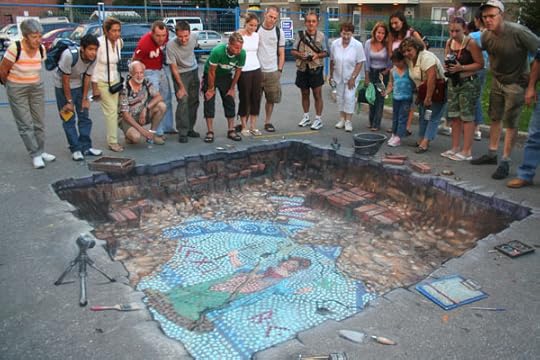
10
Beneath Every Carpark...

11
Christmas Eve in Santa’s Workshop

12
Yorkshire Water

13
Wheel of Fortune
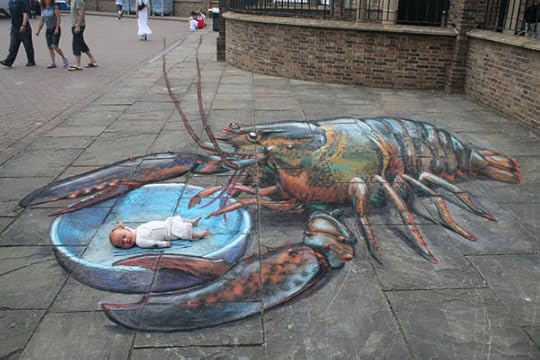
14
Babyfood

15
Babyfood
(wrong view)
Intermission

Rick Powell, founder of the San Telmo Art Walk

Brussels’ comic book murals

Street art in East Germany [pics]

16
Swimming Pool in the High Street

17
Swimming Pool in the High Street
(wrong view)
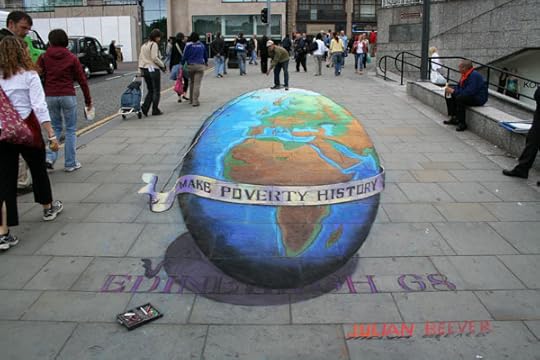
18
Make Poverty History
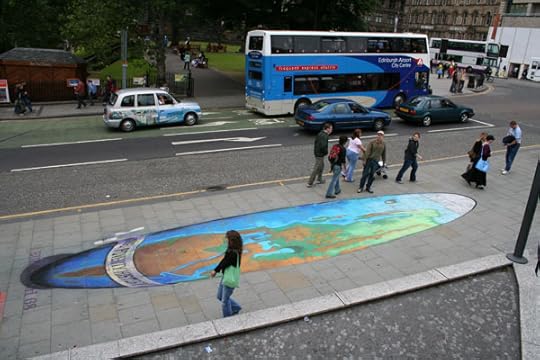
19
Make Poverty History
(wrong view)

20
The Great Green Grasshopper
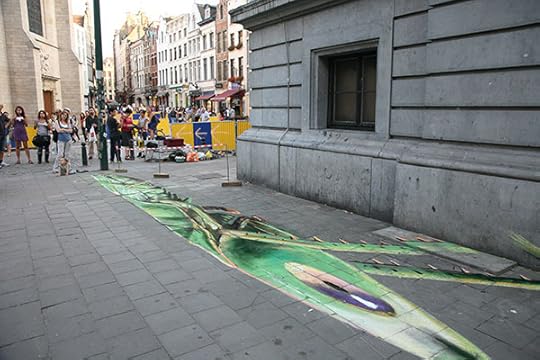
21
The Great Green Grasshopper
(wrong view)
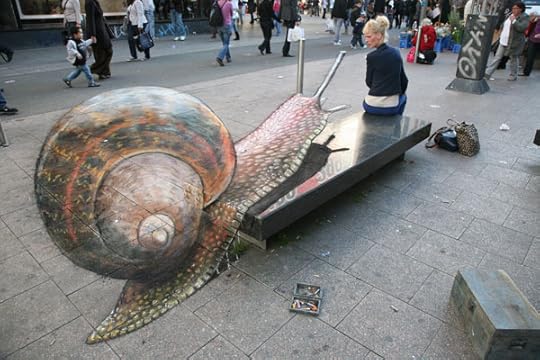
22
Snail (Back off, Creep...)
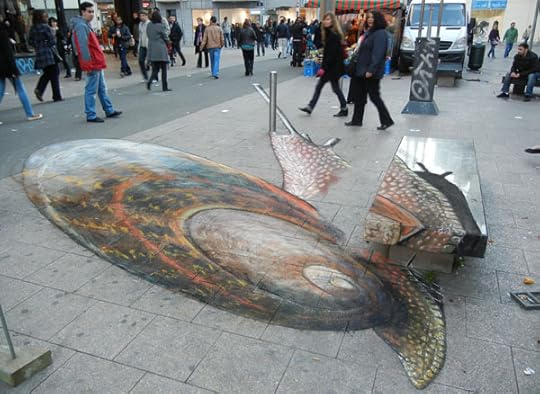
23
Snail (Back off, Creep...)
(wrong view)

24
Edgar Mueller
This German artist was born in 1968, and taught himself painting as a child (most often painting his rural hometown of Straelen). He started doing street art full-time at the age of 25.
The Ark
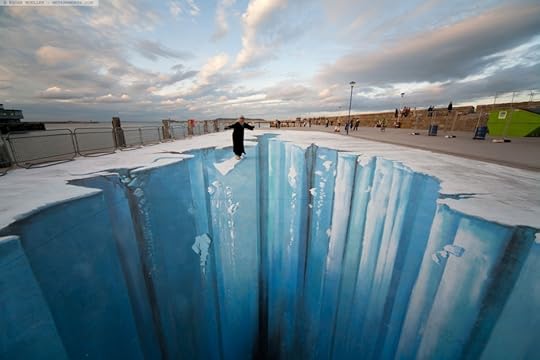
25
The Crevasse

26
Lava Burst
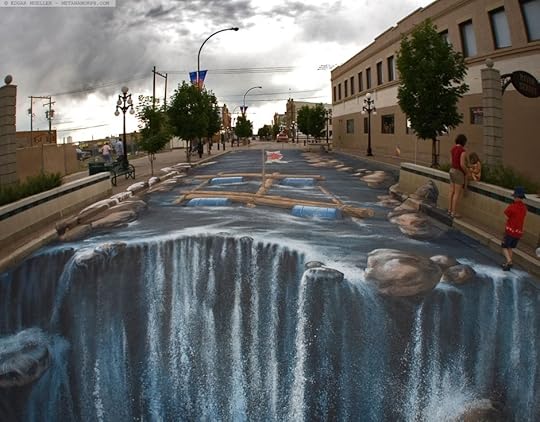
27
Waterfall
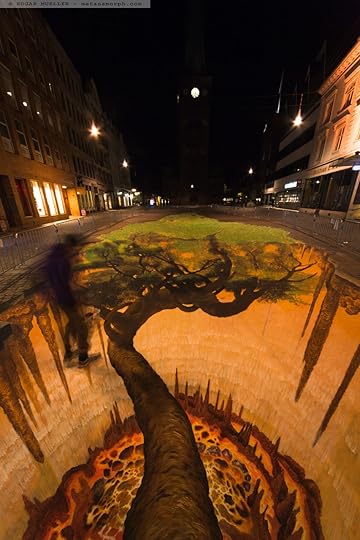
28
The Tree

29
Tribute to Mount Fuji

30
Energy
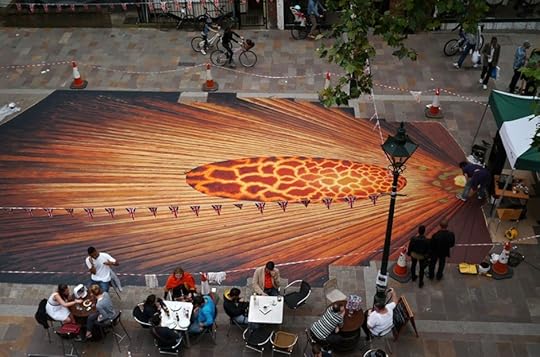
31
Energy
(wrong view)

32
Emerald Cave

33
Mysterious Cave (in Germany)

34
Duality

35
Where Do I Go

36
Phoenix

37
Tribute to the Elements

38
Eduardo Relero
Currently living and working in Spain, this Argentinian artist was born in 1964. He began painting in Rome in 1990, and currently specializes in figurative pieces with a distinctly surrealist feel.
Salida de emergencia del la modernidad

39
Oraculo Maya

40
Vida de los huevos

41
Gladiator

42
Llotja del mar
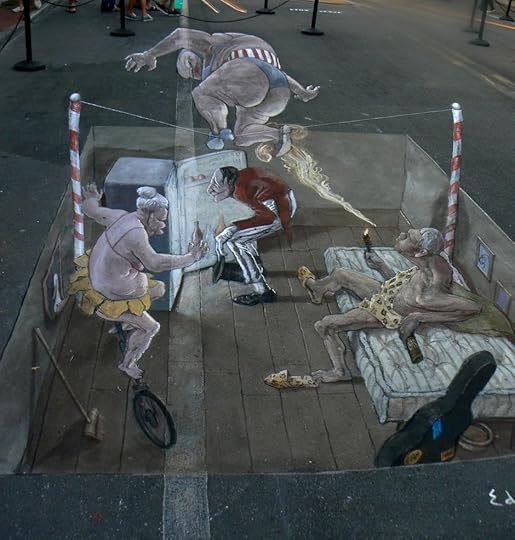
43
Untitled, Sarasota Chalk Festival

44
La deriva filosófica

45
Justicia yacente

46
Hortelano

47
Corpus
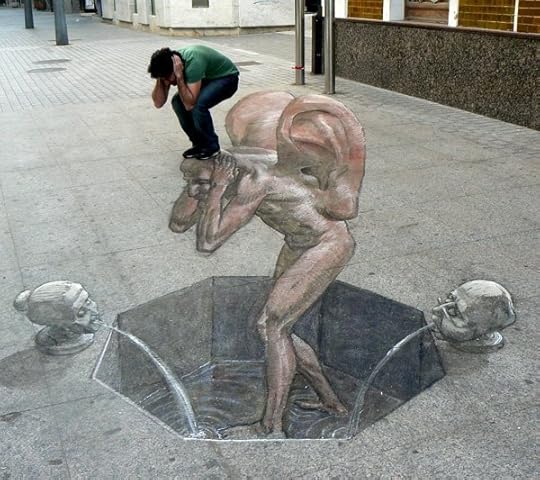
48
Siempre dentro

49
Grandes chorizos

50
Fusión musical
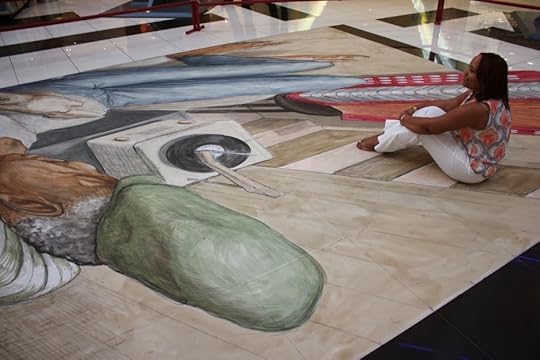
51
Fusión musical
(wrong view)

52
Cross antes de la campana

53
Cross antes de la campana
(wrong view)

54
Manfred Stader
German artist Manfred Stader began street painting while studying at the famous Städel Art School in Frankfurt in the early 1980s. Along with Kurt Wenner, he is known for bringing street painting to Old Mission Santa Barbara in 1987.
Untitled, Genussfestival in Bolzano, Italy

55
Untitled, Lodz, Poland
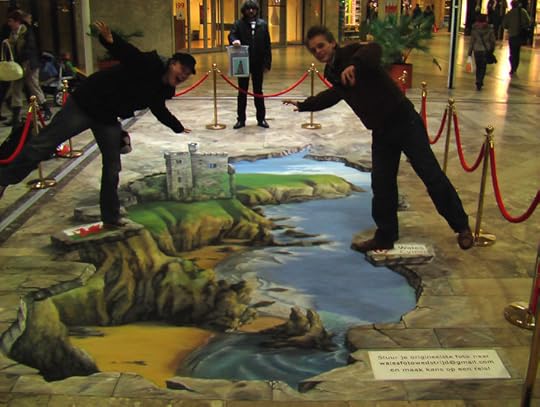
56
Visit Wales

57
Junkers
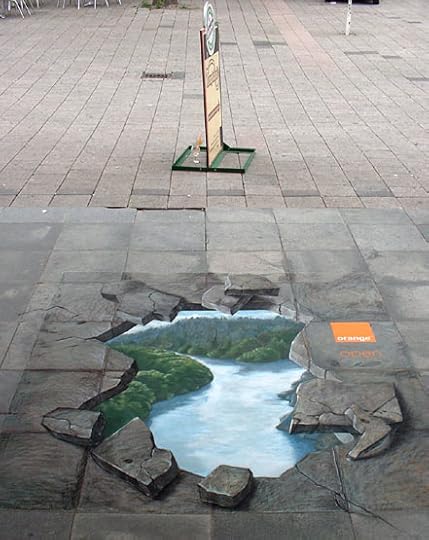
58
Orange
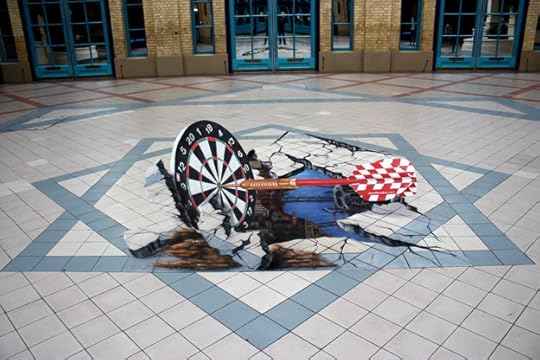
59
Untitled, Ladbrokes, London
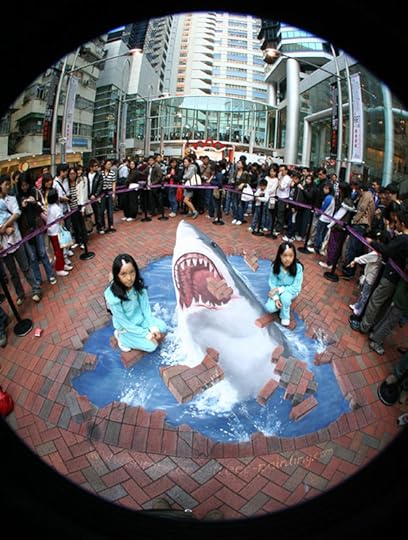
60
Untitled, Hong Kong Illusion of Arts

61
Green Week, Brussels, Belgium

62
Reflection of the Cathedral

63
Astana

64
Untitled, Bern, Switzerland

65
Untitled, Nimue Bioscience, Poland

66
Diablo 3, Gamescon, Cologne, France

67
Untitled, Babushkinsky Park Festival, Moscow

68
Untitled, Babushkinsky Park Festival, Moscow (wrong view)

69
Kurt Wenner
An American artist, Kurt Wenner is heralded as the inventor of “anamorphic” 3D chalk art. He began receiving commissions for murals at the age of sixteen and was making a living off of his art by seventeen. After attending both the Rhode Island School of Design (RISD) and the Art Center College of Design, he was employed by NASA as an advanced scientific illustrator. In 1982, Wenner quit his job at NASA, sold all of his worldly possessions, and moved to Italy to study Renaissance art (where he learned about anamorphism, which he would later employ in his 3D chalk works).
Dies Irae

70
The Flying Carpet

71
The Muses

72
Gluttony

73
The Ghetto

74
The Interrupted Tea Party
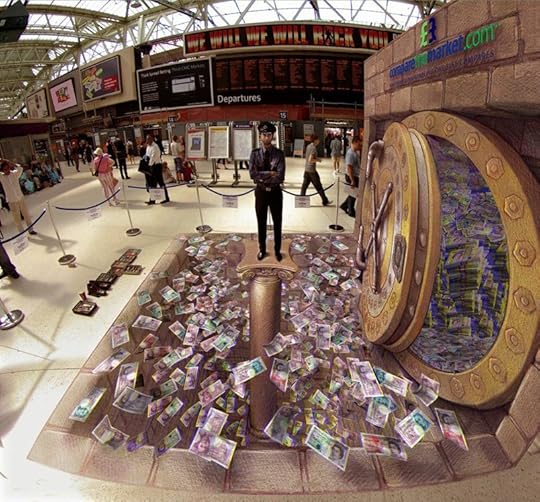
75
The Moneypit

76
Aida

77
The Sea Dragon

78
The Giant
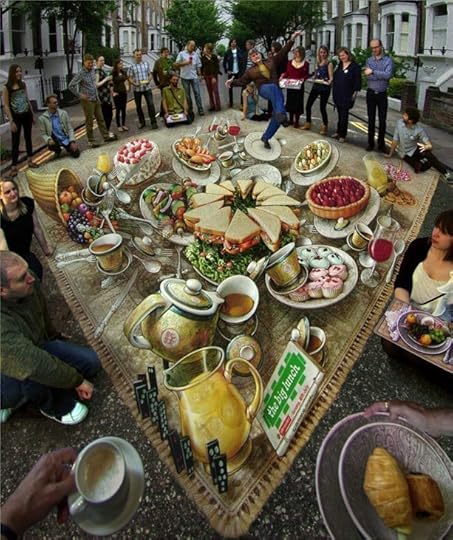
79
The Big Lunch

80
Iskandar

81
Scottsdale Neptune

82
Echo and Narcissus

83
Spiderman
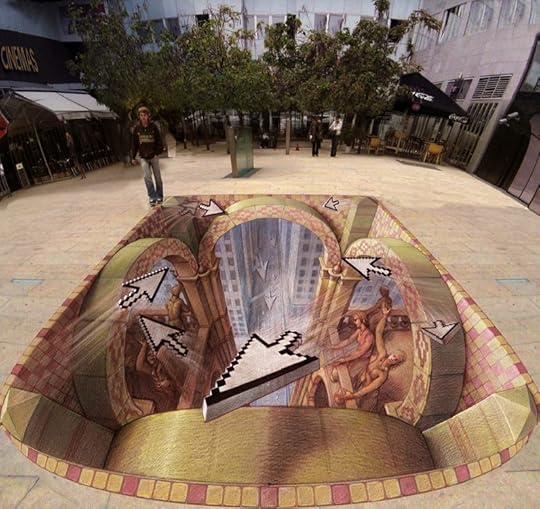
84
Cursored Czechs
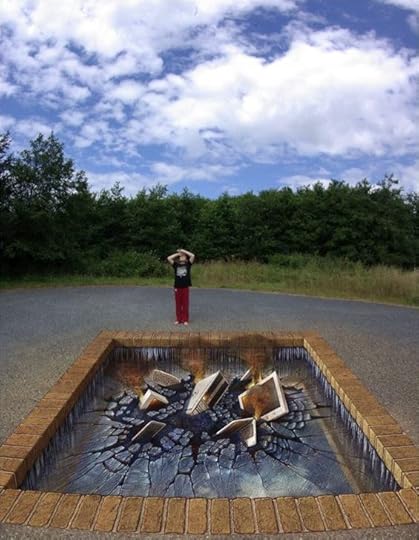
85
Information Technology

86
Nativity

87
Bonus Art
Tracy Lee Stum (American artist, studied at Tyler School of Art)

88
Joe Hill (founder of 3D Joe and Max)
Game of Thrones Commissioned by HBO

89
Game of Thrones
The post 89 of the world’s most mind-bending 3D chalk drawings appeared first on Matador Network.

How to piss of an Austinite at SXSW

Photo: Jason Garber
Trash our house just because we’re charging you $900/night.
Any Austinite who 1) owns a home within a 20-mile radius of the convention center, and 2) has the patience to navigate the city’s short-term rental permitting process, takes this annual opportunity to earn in a week what will cover their mortgage for the next couple months. Thanks, Airbnb.
When a standard double room at any of the hotels downtown is going for $900/night, you (or, more likely, your company) will probably be happy to shell out that $900 for a house where you can cram in six of your friends/coworkers with you.
Just remember — this is not a downtown hotel. This is our home. Don’t use the economics of supply and demand to justify throwing a rager and putting holes in our drywall / flooding the kitchen floor with keg foam / forever trashing our relationship with our neighbors / etc.
Wander beyond the ‘festival zone.’
There may be 20+ official SXSW venues, but they’re almost all contained within the greater downtown area. In recent years we’ve even ceded you the East Side south of 6th.
The line must be drawn here.
Do not venture up onto the drag, North Loop, or Rosedale. South Lamar, Manor, and Oltorf are off limits. These are the places we depend on for escape, those of us who have built and every day live that unique Austin culture you and the rest of the world have decided to fetishize so fiercely. Those of us who aren’t “knowledge workers,” or at least don’t work for companies willing to shell out thousands for “networking opportunities.”
Give us our space.
Tweet your every waking moment.
Not because we’re following you and don’t want our feeds inundated with inane quotes from that panel on ‘How to optimize your crowdsourcing app for Millennials.’ Because we don’t want you walking out in front of traffic.
We may not be super fond of you, but we’re not assholes. Don’t die in Austin.
Complain about the lines.
This one gets us every time. You are the line. The line is you. You might as well curse your feet for adding 5lbs to your body weight.
Imagine how we feel, the third-class citizens in the walk-up ticket line, watching as badge- and then pass-holders shuffle in and fill up the theater for the film we really wanted to see. An hour later and we’re driving home empty-handed — if anyone is allowed to complain about the lines, it’s us.
Treat the city like your private playground.
Okay, so we didn’t exactly help the cause in 2012 when we outfitted homeless people with wifi hotspots and had them hang out around the convention center.
This incident aside, we’d like you to remember that the city of Austin and its residents are not here to facilitate and enhance your experience at our marquee festival. Don’t expect us to have exact directions to your super obscure party venue, don’t hit us up on the street asking to buy weed, and don’t be surprised when we write articles enumerating the ways in which you piss us off.
Think you can “grab a bite” at Franklin and make the noon show at the Radio Day Stage.
Getting a taste of what’s been called the best BBQ in the world requires a minimum two-hour wait on any random Thursday morning of the year. When we’re talking the Thursday during SXSW Music? Good luck.
Expect us to be impressed that you’re speaking on a panel.
Step 1: Take the SXSW program booklets out of your swag bag. Step 2: Flip through the pages and count the number of panels, talks, dialogues, one-on-ones, keynotes, workshops, etc. Step 3: Ask yourself again if you should expect anyone to be impressed that you’re one among hundreds.
Wear your badge into the 7-11.
I’m sure we’d all really like to have unfettered access to talks by VPs of the world’s top tech firms, shows by the world’s top bands, and Q&As with the world’s top film directors. But many of us are never going to be able to afford throwing down for that lanyard and the RFID-chipped card hanging from it.
Your badge represents an expenditure of anywhere from $500 to $1,700. You wouldn’t walk around with your MacBook Air around your neck, and the dude behind the counter at 7-11 doesn’t need to check your badge for that six pack of Lone Star. Put it in your fucking pocket.
Ask us where the bats are.
Oh dear.
Use a cab to go six blocks.
The bars just closed on Rainey Street and now you’re faced with an epic journey back to the Residence Inn. Please, please just walk. Because for those of us who had one too many at Mister Tramps, the Draught House, or Contigo, the road home is likely slightly longer, and we’d really appreciate not having to wait two hours for a cab.
Or, if you’ve been hitting the company card a bit too hard at Lustre Pearl and can’t put one foot in front of the other, we know for a fact there’s a pedicab with your name on it.
Ask when/where the “secret show” is.
Fact 1: If we knew, it wouldn’t really be “secret,” would it? Fact 2: If we did know, and told you, it definitely wouldn’t be secret.
If you persist, we’ll be happy to direct you to a parking garage on San Jacinto that very well could be witnessing the sickest, secretest show in the history of SXSW. Make sure to tell us how it was.
Complain about not being able to find enough free food and beer, or that you’re tired of being forced to download apps in exchange for said free food and beer.
If there’s a better application for #firstworldproblems, we haven’t seen it.
Move here.
It happens every year: You spend a couple days in town, the weather is fucking gorgeous, the whole city is one big party that you have an exclusive invite to, and you think…I should move to Austin!
Let me fast forward a few months for you, when you’re waking up to your 30th straight day of 100+ degrees, and all you can hope to do is go from air-conditioned house to air-conditioned car to air-conditioned office and back again without getting heatstroke. This is also Austin, and it lasts a hell of a lot longer than SXSW.
And, you know, there’s the whole Texas thing. You’d hate it here. You’re welcome. 
The post How to piss off someone from Austin during SXSW appeared first on Matador Network.

Matador Network's Blog
- Matador Network's profile
- 6 followers


